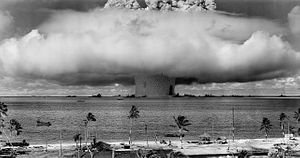On Wednesday, October 5, the International Court of Justice decided against proceeding with the Marshall Island’s nuclear disarmament case, which was lodged earlier against India, Pakistan, and the United Kingdom. The small Pacific Island nation had entered proceedings at the ICJ earlier this year at the Hague-based court, which is the primary judicial arm of the United Nations.
The case grew out of a legacy of nuclear weapons testing in the Marshall Islands by the United States between 1946 and 1958; in 2014, the Marshall Islands filed suit against nine nuclear weapon states at the ICJ — China, North Korea, France, India, Israel, Pakistan, Russia, the United Kingdom, and the United States — accusing them of insufficiently “fulfilling their obligations with respect to the cessation of the nuclear arms race at an early date and to nuclear disarmament.” India, Pakistan, and the United Kingdom ended up defending themselves at the ICJ this year over their declarations to accept ICJ’s compulsory jurisdiction under article 36, paragraph 2 of the court’s statute.
An initial tied vote, with eight members of the court in favor and eight against, upheld the case made by the United Kingdom against the filing, underlining a lack of evidence that a dispute even existed. The ICJ’s decision on this count meant that the Marshall Islands’ complaints would go unaddressed as the court would lack jurisdiction. A second vote, with nine in favor and seven against, upheld similar objections by India and Pakistan as to the lack of evidence.
Phon van den Biesen, a co-agent of the Marshall Islands, despite the ICJ’s decisions on jurisdiction, expressed pleasure with the vote margins. “We are pleased that the Court recited its unanimous decision of 1996 that there exists an obligation to pursue in good faith negotiations leading to nuclear disarmament in all its aspects,” he noted.
“Likewise we are pleased that half of the judges of the highest court in the world confirmed, as the Marshall Islands alleged, that jurisdiction exists here,” he added. Finally, addressing the decisions, which meant that the case would not proceed to an evaluation of the merits of the Marshall Islands’ case, van den Bisen added: “Nonetheless it is difficult to understand how eight judges could have found that no disputes existed in these cases when they were filed. So that is very disappointing. It is particularly worrying that the World Court cannot be unanimous on what it takes to establish a dispute in the context of nuclear disarmament.”
As I explained in the Diplomat earlier this year, U.S. nuclear testing in the Marshall Islands has deeply affected the country’s sensitivity toward the issue of nuclear weapons. Tony de Brum, the Marshall Islands’ foreign minister, noted earlier this year that the people of the Marshall Islands “have suffered the catastrophic and irreparable damage of these weapons and we vow to fight so that no one else on earth will ever again experience these atrocities.”
While the ICJ case was largely expected not to proceed to a deliberation on the merits of the case by the Marshall Islands, it did draw headlines and spark a public debate on nuclear disarmament. The participation of India and Pakistan, in particular, as non-signatory states to the Nuclear Non-proliferation Treaty (NPT) and two mutually rivalrous neighbors with growing nuclear weapons stockpiles, underlines the continuing threat of nuclear weapons use during conflict. (That the ICJ’s decision comes at a time of particular tension between the two South Asian nuclear giants is also notable.)
Finally, the case is far from a loss for the cause of nuclear disarmament championed by the Marshall Islands. Even while it did not decide to proceed with a consideration of the merits put forward by the Marshall Islands, the ICJ’s ruling reaffirms a non-binding 1996 advisory opinion on nuclear weapons, which found that states ought “to pursue in good faith and bring to a conclusion negotiations leading to nuclear disarmament in all its aspects under strict and effective international control.” Of course, this will stand as a declaratory statement of international law without any enforcement mechanisms, but can ostensibly serve to strengthen the global taboo against nuclear weapons use.

































